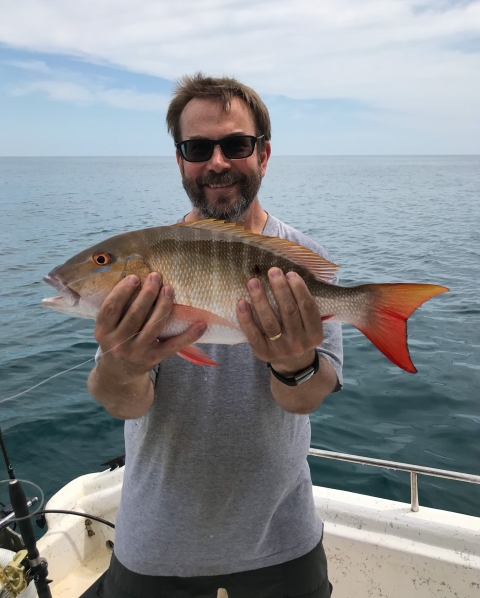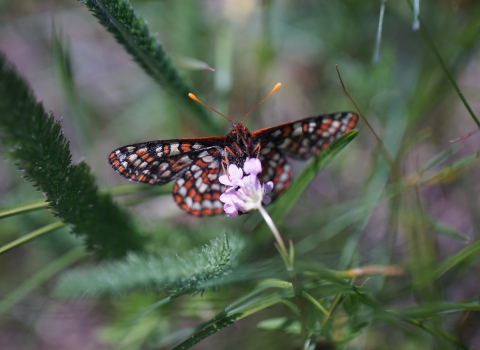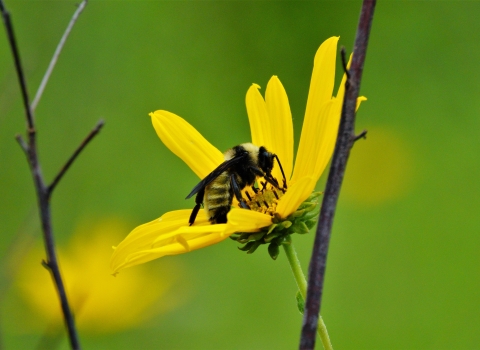PORTLAND, Oregon – The U.S. Fish and Wildlife Service (Service) has announced Scott Covington as the new assistant regional director of Science Applications in the Pacific Region.
Science Applications is a non-regulatory program within the Service that tackles conservation issues no single Service program or conservation partner can address alone. The program brings partners together to identify shared conservation priorities and deliver scientific information and tools needed to achieve conservation goals across the landscape. With a foundation of climate adaptation, the work of Science Applications sits at the nexus of landscape conservation, inclusive collaboration and science support. Covington will lead the Science Applications program in the Pacific Region, which comprises Hawaiʻi, Idaho, Oregon, Washington and the Pacific Islands, including America Samoa, Guam and the Commonwealth of the Northern Mariana Islands.
“We’re excited to add Scott to our team. He is poised to embrace the challenges of addressing highly visible and complex issues in the Pacific Region,” said Hugh Morrison, regional director for the Service’s Pacific Region. “This is an important role that works closely with states, Tribes, federal agencies and partners to look for solutions to landscape-level conservation challenges.”
Covington began his Service career 16 years ago as an energy biologist with the Ecological Services program. In his breadth of experience in the Service, as well as numerous years working with Vermont Fish and Wildlife Department and Wyoming Fish and Game, he has held various leadership positions at the state, regional and program levels. Most recently, Covington worked as a senior ecologist in the Service’s National Wildlife Refuge System in Falls Church, Virginia.
In his career, Covington has represented the Service as a senior leader, administrating programs for energy and leading climate science activities across the National Wildlife Refuge System. He has assisted managers and conservation partners with efforts to reduce atmospheric greenhouse gasses, developed strategies to adapt to climate change climate change
Climate change includes both global warming driven by human-induced emissions of greenhouse gases and the resulting large-scale shifts in weather patterns. Though there have been previous periods of climatic change, since the mid-20th century humans have had an unprecedented impact on Earth's climate system and caused change on a global scale.
Learn more about climate change and engaged staff and external partners on climate change issues and methods to reduce its effects on fish and wildlife.
Covington co-developed the Service’s Climate Change Action Program, which provides overarching guidance for incorporating climate change into all Service actions. He has also coauthored climate policy updates and led efforts within the Service and the conservation community to normalize the concepts of the Resist-Accept-Direct (RAD) Framework, which supports more resilient and informed decision-making in conservation planning and management. Covington has co-led a Civilian Climate Corp fellows’ group, working through the Hispanic Access Foundation to hire candidates responsible for developing guidance to assess climate impacts on refuge lands, develop scenarios of future climate impacts on host refuges and provide recommendations to address ecological transformation.
“I’m excited to begin this new phase of my career and I’m further energized by the support and dedication I’ve observed in the Pacific Region staff,” Covington said. “I’m determined to see Science Applications continue to provide important resources that helps the Service, Tribes and partners make forward-thinking decisions in the face of a changing climate.”
Covington is committed to bringing an inclusive, diverse and equitable standard to the workplace, enabling a work environment and organizational culture that values and promotes diversity of both persons and points of view in meeting the Service's mission.
Covington, originally from Benton, Arkansas, earned his Bachelor of Science in aquatic biology/limnology from the University of Arkansas and a Master of Science in zoology and physiology from the University of Wyoming.
###
The U.S. Fish and Wildlife Service works with others to conserve, protect and enhance fish, wildlife, plants and their habitats for the continuing benefit of the American people. For more information, visit https://www.fws.gov/about/region/pacific and connect with us on social media: Facebook, Instagram, Twitter, LinkedIn, Flickr, and YouTube.



